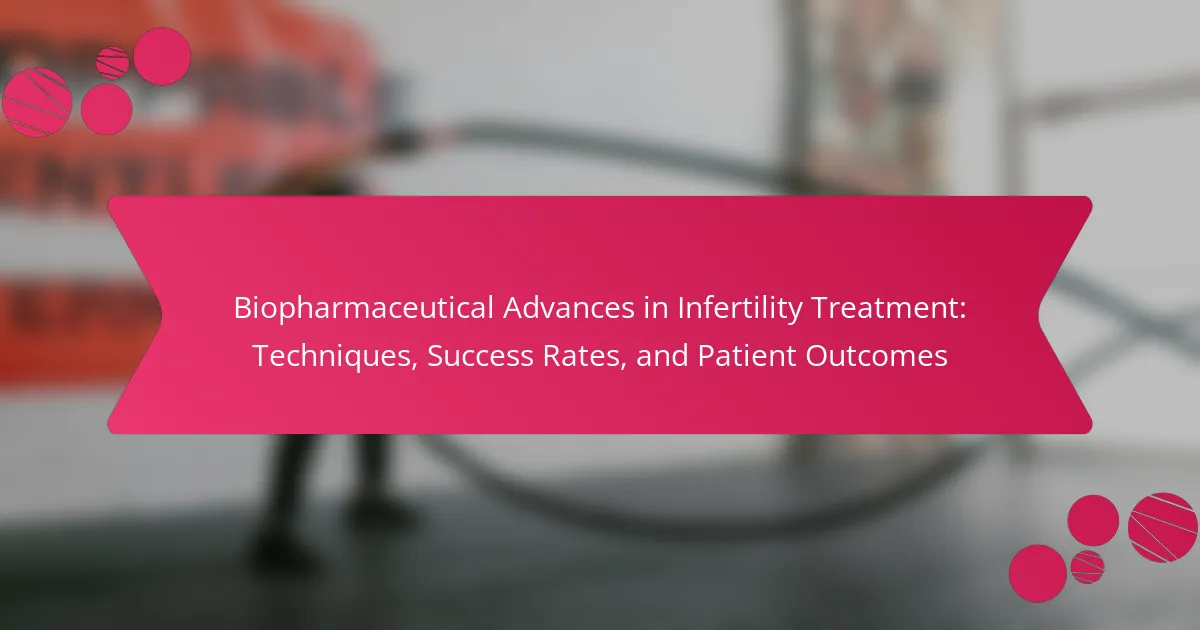Biopharmaceutical advances in infertility treatment offer hope for couples facing challenges in conceiving. This article explores innovative techniques like gene editing and personalised medicine, examines success rates influenced by patient factors, and discusses the psychological impacts of treatment. Additionally, it highlights emerging trends and ethical considerations in the field, aiming to provide a comprehensive overview of how these advancements improve patient outcomes.

What are the latest biopharmaceutical techniques in infertility treatment?
Recent biopharmaceutical techniques in infertility treatment include advanced gene editing, stem cell therapy, and personalised medicine. These innovations enhance success rates and improve patient outcomes significantly. For instance, CRISPR technology allows precise genetic modifications, potentially reducing hereditary infertility issues. Stem cell therapy offers regenerative options for ovarian and testicular function. Personalised medicine tailors treatments based on individual genetic profiles, optimising efficacy. As a result, patients experience higher success rates and better overall satisfaction in their fertility journeys.
How do these techniques improve success rates?
Biopharmaceutical techniques significantly enhance success rates in infertility treatment by improving embryo quality and increasing implantation rates. Advanced methods like preimplantation genetic testing and hormonal therapies optimise patient outcomes. For instance, these techniques can lead to a success rate increase of up to 30% compared to traditional methods. Additionally, personalised treatment plans based on individual health profiles further contribute to improved efficacy and patient satisfaction.
Which biopharmaceuticals are most commonly used in fertility treatments?
Common biopharmaceuticals used in fertility treatments include gonadotropins, clomiphene citrate, and letrozole. Gonadotropins stimulate ovulation, while clomiphene citrate and letrozole promote follicle development. These medications enhance success rates in assisted reproductive technologies.

What factors influence patient outcomes in infertility treatments?
Several factors significantly influence patient outcomes in infertility treatments. Key elements include the patient’s age, underlying health conditions, treatment type, and the clinic’s expertise. Younger patients generally experience higher success rates due to better egg quality. Additionally, conditions such as polycystic ovary syndrome or endometriosis can affect treatment efficacy. The choice of treatment, whether in vitro fertilisation or medication, also plays a crucial role in the outcomes. Lastly, clinics with advanced technology and experienced staff tend to achieve better results, highlighting the importance of provider quality.
How do age and health conditions affect treatment success?
Age and health conditions significantly influence treatment success in infertility. Younger patients often experience higher success rates due to better egg quality and overall health. Chronic health issues, like diabetes or obesity, can complicate treatment outcomes, as they may affect hormonal balance and reproductive function. Additionally, age-related factors, such as diminished ovarian reserve, can lead to lower success rates in older patients. Tailored treatment plans that consider these variables can enhance patient outcomes.
What role do lifestyle changes play in enhancing treatment efficacy?
Lifestyle changes significantly enhance treatment efficacy in infertility by improving overall health and hormonal balance. For instance, weight management, nutrition, and exercise can increase the success rates of biopharmaceutical interventions. Studies show that maintaining a healthy weight can improve ovulation and sperm quality. Additionally, stress reduction techniques, such as mindfulness and yoga, have been linked to better patient outcomes. These lifestyle modifications complement biopharmaceutical advances, creating a holistic approach to infertility treatment.

Which biopharmaceutical advances have shown the highest success rates?
Biopharmaceutical advances in infertility treatment, such as in vitro fertilisation (IVF) and intracytoplasmic sperm injection (ICSI), have shown high success rates. IVF success rates range from 40% to 60% depending on patient age and health factors. ICSI, particularly beneficial for male factor infertility, boasts similar success rates.
Emerging techniques like preimplantation genetic testing (PGT) enhance outcomes by identifying viable embryos, further increasing IVF success rates. Additionally, advancements in cryopreservation techniques allow for better embryo storage, contributing to improved patient outcomes.
Overall, the integration of these biopharmaceutical advances significantly enhances the likelihood of successful pregnancies, showcasing the positive impact of technology in infertility treatment.
What are the comparative success rates of different treatment options?
Different infertility treatment options have varying success rates, influenced by factors such as age and underlying conditions. In vitro fertilisation (IVF) generally shows a success rate of 40% to 50% for women under 35, while intrauterine insemination (IUI) has a success rate of 10% to 20% per cycle. Egg freezing success rates range from 2% to 12% per thawed embryo. Donor egg IVF presents higher success rates, around 60% to 70%. Each treatment’s effectiveness can depend on individual circumstances, emphasizing the need for personalised approaches.
How do success rates vary across different demographics?
Success rates in infertility treatments vary significantly across demographics. Factors such as age, ethnicity, and socioeconomic status influence outcomes. For instance, women under 35 typically experience higher success rates, often exceeding 40%. Conversely, women over 40 see rates drop to 10-20%. Ethnic variations also exist, with studies showing varying response rates to treatments among different groups. Additionally, socioeconomic factors can impact access to advanced treatments, thus affecting overall success rates.

What are the psychological impacts of infertility treatments on patients?
Infertility treatments can lead to significant psychological impacts on patients, including anxiety, depression, and feelings of isolation. These emotional challenges often stem from the stress of treatment cycles, financial burdens, and societal pressures. Research indicates that approximately 40-50% of individuals undergoing these treatments experience psychological distress.
Support systems, such as counselling and support groups, can mitigate these effects by providing emotional assistance and fostering a sense of community. Additionally, the success rates of treatments can influence psychological well-being; higher success rates tend to correlate with reduced anxiety levels.
The unique attribute of each patient’s experience with infertility treatment can lead to varied psychological outcomes, emphasizing the need for personalised care approaches. Understanding these impacts is crucial for healthcare providers to support patients effectively throughout their journey.
How can support systems improve patient experiences during treatment?
Support systems significantly enhance patient experiences during infertility treatment by providing emotional, informational, and logistical support. These systems foster a sense of community and reduce feelings of isolation. They also offer access to resources, improving understanding of treatment options and outcomes. Studies indicate that patients with strong support networks report higher satisfaction and better adherence to treatment protocols. This results in improved success rates and overall well-being during the challenging journey of infertility treatment.
What are common emotional challenges faced during the treatment process?
Common emotional challenges during infertility treatment include anxiety, depression, and feelings of isolation. Patients often experience a rollercoaster of hope and disappointment due to fluctuating success rates of biopharmaceutical techniques. The stress of medical appointments and procedures can exacerbate these feelings, leading to emotional fatigue. As a result, support systems and counselling are essential for managing these challenges effectively.

What are the emerging trends in biopharmaceutical research for infertility?
Emerging trends in biopharmaceutical research for infertility include personalised medicine, gene editing, and advanced reproductive technologies. These innovations aim to enhance treatment efficacy and improve patient outcomes. Personalised medicine tailors therapies based on genetic profiles, increasing success rates. Gene editing techniques, like CRISPR, show potential in addressing genetic causes of infertility. Advanced reproductive technologies, such as in vitro gametogenesis, offer new options for patients. As a result, these trends signify a shift toward more effective and individualised infertility treatments.
Which innovative therapies are currently in clinical trials?
Several innovative therapies for infertility are currently in clinical trials, focusing on advanced biopharmaceutical techniques. These include gene editing approaches, stem cell therapies, and novel hormonal treatments designed to enhance success rates. Clinical trials are evaluating their efficacy in improving patient outcomes and addressing various infertility causes. For example, CRISPR technology aims to correct genetic abnormalities affecting fertility. As a result, these cutting-edge methods may redefine infertility treatment standards in the near future.
How is personalised medicine shaping the future of infertility treatments?
Personalised medicine is revolutionising infertility treatments by tailoring therapies to individual patient profiles. This approach enhances success rates and improves patient outcomes. For instance, genetic testing can identify specific hormonal imbalances, allowing for customised treatment plans. As a result, patients experience higher chances of conception and fewer failed cycles. Additionally, advancements in biopharmaceuticals provide targeted medications that address unique fertility issues, further shaping the landscape of infertility care.

What are the ethical considerations surrounding biopharmaceutical infertility treatments?
Ethical considerations in biopharmaceutical infertility treatments include informed consent, access to care, and potential exploitation. Patients must fully understand the risks and benefits before undergoing procedures. Access disparities can lead to inequities in treatment availability, raising concerns about fairness. Additionally, the commercialisation of treatments may exploit vulnerable populations, necessitating regulations to protect patients.
How do regulations differ across regions for infertility medications?
Regulations for infertility medications vary significantly across regions, impacting availability and treatment options. In the United States, the FDA oversees drug approval and monitoring, while in Europe, the EMA plays a similar role. Countries like Canada have their own regulatory frameworks, often aligning with European standards. In contrast, some regions may have less stringent regulations, allowing quicker access to new treatments. These differences can affect patient outcomes, as access to advanced biopharmaceuticals varies. Understanding these regulations is crucial for patients seeking infertility treatments globally.
What are the implications of genetic testing in treatment decisions?
Genetic testing significantly influences treatment decisions in infertility by providing personalised insights. It helps identify specific genetic factors affecting fertility, guiding tailored interventions. For instance, testing can reveal chromosomal abnormalities, which may lead to options like preimplantation genetic diagnosis. This precision enhances success rates and improves patient outcomes, as treatments align more closely with individual genetic profiles. Additionally, understanding genetic risks can inform patients about potential hereditary conditions, allowing for informed reproductive choices.

What best practices can enhance the effectiveness of infertility treatments?
To enhance the effectiveness of infertility treatments, patients should consider personalised approaches and evidence-based techniques. Integrating biopharmaceutical advances, such as targeted therapies and improved hormonal treatments, can significantly increase success rates. Regular monitoring and adjustments to treatment plans based on individual responses also play a crucial role in optimising outcomes. Additionally, lifestyle modifications, including nutrition and stress management, support overall reproductive health and treatment efficacy.
How can patients optimise their treatment plans with healthcare providers?
Patients can optimise their treatment plans by actively collaborating with healthcare providers. Open communication ensures that patients understand their options, including biopharmaceutical advances in infertility treatment. Regularly discussing treatment goals and preferences can lead to personalised care strategies, improving success rates and outcomes.
Patients should keep track of their medical history, treatment responses, and any side effects. This information empowers providers to make informed adjustments to the treatment plan. Engaging in shared decision-making fosters a partnership that enhances the overall treatment experience.
Additionally, staying informed about the latest techniques and research in infertility treatment can help patients advocate for their needs. Understanding the implications of specific biopharmaceuticals can guide discussions with healthcare providers.
Ultimately, a proactive approach that includes education, communication, and collaboration can significantly enhance treatment effectiveness and patient satisfaction.
What common mistakes should patients avoid during the treatment journey?
Patients should avoid common mistakes like neglecting communication with healthcare providers, skipping follow-up appointments, and ignoring prescribed protocols. These errors can hinder treatment effectiveness and negatively impact outcomes.
1. Failing to discuss concerns or side effects with the medical team can lead to unresolved issues.
2. Missing scheduled appointments can disrupt the treatment timeline and reduce chances of success.
3. Not adhering to medication instructions may result in suboptimal responses to therapies.
4. Overlooking lifestyle factors, such as diet and stress management, can affect overall treatment efficacy.
